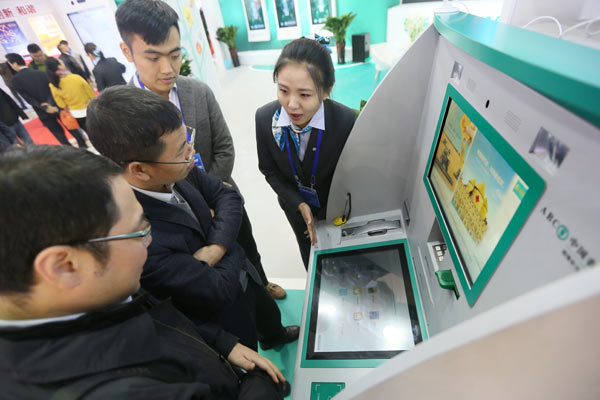Profits show real economy recovery
 |
|
Vistors check out the booth of Agricultural Bank of China at the 12th International Financial Expo in Beijing. [Photo by A Qing/For China Daily] |
Transportation and logistics, food and beverages, and infrastructure-related sectors reported profit surges in 2016, according to annual results filed by companies listed in Shanghai and Shenzhen, showing China's real economy is recovering, and is shifting to the consumption-driven growth model.
By early April, 1,195 companies had released their annual results for 2016, among which 1,142 reported profits.
High-tech companies and the manufacturing sector are expected to perform better in 2017, benefiting from upgraded and expanding consumption trend across the nation, said analysts. Annual results of companies in these sectors are recovering, as shown in their 2016 annual results.
Banks, as usual, are among the profit leaders in the 2016 A-share market. The top five most profitable companies of all A-share listed companies are Industrial and Commercial Bank of China, China Construction Bank, Agricultural Bank of China, Bank of China, and Bank of Communications, with combined profit of more than 530 billion yuan ($77 billion).
Analysts said that banks' annual results showed that consumption-related loans are growing fast, reflecting the overall trend of China's economic growth pattern which is shifting from intensive investment-driven to consumption driven.
"For example, personal consumption loans, such as for cars, will expand soon," said a research note from Haitong Securities.
Sheng Laiyun, spokesman with the National Bureau of Statistics, said last month that major indexes from the beginning of the year show that the real economy is getting more "active", and profits are growing.
He said in 2017, as supply-side reform deepens and pro-real economy market conditions improve, there will be more demand for industrial output.
For banks, lending to enterprises, particularly manufacturers, are likely to reach higher levels than in 2016, according to Bank of Communications.
Transportation and logistics companies also reported fast growing profits in 2016. Shanghai International Port Group reported net profit of 6.94 billion yuan, a 5.74 percent year-on-year increase and Nanjing-Shanghai High Way reported profit of 3.35 billion yuan, a 33.49 percent year-on-year increase.
The top 100 most profitable entities in the A-share market also included several food and beverage companies and pharmaceutical and healthcare companies.
Yili Dairy reported a 5.6 billion yuan profit, a 22.24 percent year-on-year increase and Chinese white liquor maker Wuliangye reported 6.79 billion yuan in profits, a 9.85 percent year-on-year increase.
Shanghai Pharma's net profit in 2016 was 3.2 billion yuan, accounting for 11.1 percent year-on-year growth, and Fosun Pharma's net profit was 2.8 billion yuan, a 14.05 percent year-on-year increase.
According to Fan Gang, Chinese economist and member of the monetary policy committee of the People's Bank of China, the central bank, consumption-driven growth will contribute a larger portion to overall economic growth.
"Currently most consumption in China is focused on products, such as food, garments and healthcare products and there is little consumption for services, showing that China's consumption growth is still in its initial stage, with considerable room for growth," said Fan.
In the first quarter of 2017, the A-share benchmark index, the Shanghai Composite Index, grew 3.43 percent and the Shenzhen component index grew 1.68 percent year-on-year, despite volatility.
"In the second quarter, opportunities weigh over risks as consumption, the Belt and Road Initiative and deepened State-owned enterprises reforms will further take effect, bringing benefits to the overall A-share market, attracting more capital to the market and improving liquidity," said a research note from Everbright Securities.









